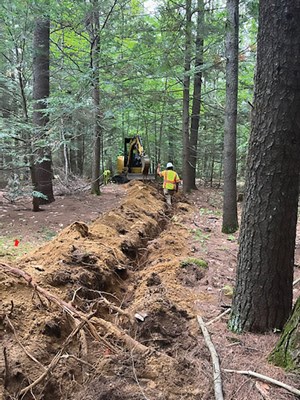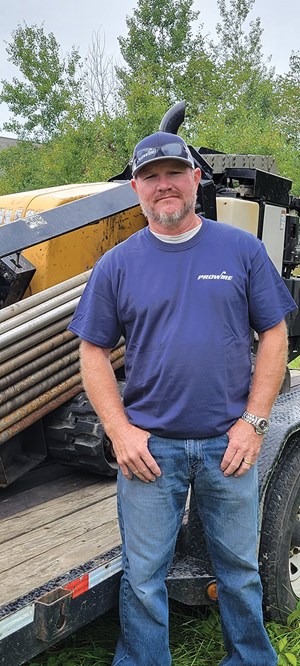December 2022 Vol. 77 No. 12
Features
Telecom Boom Enables Growth of Small, Quality Contractor
Jeff Griffin | Senior Editor
(UC) — The changing face of telecommunications continues to present unique opportunities for the growth of small, quality contractors. Telecommunications contractor Prowire Inc. has opened a branch office in Albion, Maine, to better service its clients throughout Maine and New Hampshire. The home office is in South Paris, Maine.
Prowire owner Mat Striegel said he started the business in 2003 with a pickup and a shovel. His goal was to be a subcontractor to make drops to telephone and cable to connect customers’ properties, for service providers and other contractors.
Since then, the company has evolved to a full-service cabling contractor for both underground and aerial construction.
“We operate with large vibratory plows, drop plows, excavators, horizontal directional drills, pipe pushers and support equipment,” he said. “We do everything underground, not just drops.
“But we often subcontract drops for other contractors to complete connections jobs, and we also do drops for Consolidated Communications.”
In Maine, Striegel said, no cable is direct buried – all cable goes in conduit that is buried and wire pulled through it. Typically, clients do not specify how underground plant is to be buried, Striegel added. It is left to the contractor to select the most efficient method for job-site conditions.
Challenging soils
An example of how difficult Maine soil can be to work in was a project that required extending a segment of a line extension. About 400 feet of the projected path was nothing but boulders. Striegel used two excavators to move boulders aside.
“We used excavator ‘thumbs’,” he said, “to move rocks around and build a rock ‘conduit’ to protect the new pipe. We were there two days with the two machines; it was very time consuming, but we got the job done for a very-pleased customer.”
Maine winters limit underground work to nine months a year, so Prowire expanded its capabilities to include aerial plant in order to stay busy a full 12 months.
In some situations, however, an underground segment of a project has to be completed in the winter.
“On one project,” said Striegel, “the ground was freezing when we got to the job site, but more than a foot of snow helped insulate the ground.
“We met the locators on site, cleared a path through the snow, and got existing utilities marked. We immediately plowed in the duct, leaving chunks of topsoil on the ground. We came back in the spring and finished restoration.”
Prowire now has a fleet of bucket trucks, and the equipment and trained personnel to complete turnkey projects, whether aerial or underground.
“For the cable companies, we are full service,” said Striegel. “We can build every aspect of the aerial plant – from setting the poles, running strand and cable/fiber, splicing, activation, testing – and have maintained our underground capabilities.
“We have fiber techs equipped with fusion splicers. We also have a full MDU crew that rewires hotels, hospitals, apartment buildings, and other commercial properties.”
Clients include Consolidated Communications, FirstLight Fiber, GoNetSpeed and municipalities with their own fiber systems.
Historically, Maine had not put telephone and cable underground, and Striegel commented there are no programs in the state to convert aerial to underground.
“There has been so much growth here that providers do not have the budget or resources to convert,” he pointed out.
But the rate of underground utility construction is increasing.
“The big thing up here,” Striegel explained, “is what is considered ‘beautification.’ As beach houses become mansions, the new owners are paying out-of-pocket to have aerial plant taken down and put underground to enhance scenic views from their properties. Maine is a beautiful state and people are starting to get more particular about the utilities and their appearance.”
Growth
Striegel began his career in telecom construction as a backhoe operator for a contractor in his hometown of Guthrie, Okla. He worked for a time as a drop contractor in Virginia, then moved to Maine where he ultimately established Prowire.
“My first and only piece of equipment,” he said, “was a small Vermeer machine with a vibratory plow on the back end and trencher on the front. From there we got an old Case backhoe that opened more opportunities. Next came a Cat excavator that was actually capable of working every day without breaking down.
“As we added equipment, we added crews. We grew slowly and were able to get the right people doing the jobs. The decision to add aerial capabilities also was a significant step in our growth, and that required more and different equipment.”
What’s next?
“The Albion office,” said Striegel, “is making the northern half of the state more available to us. I would like to see 20 guys up there to keep up with the work load. A drill crew, trenching crews and line trucks will be required.
“I am shopping for a larger directional drill to support the larger jobs that we are encountering in the north. Northern Maine is largely rural, and many areas have limited access to broadband. The work we are seeing up there is not measured in feet, but miles. This is new for us, as most of Southern Maine is already built out.”
Of the three states in which Striegel has done underground construction, “Maine is by far the most challenging environment I have encountered,” he said. “The ledges, boulders, frost and swamps make it a very difficult place to get cable in the ground.
“We also lose our ability to dig in the winter once the ground is frozen. Even with a rock saw, we are discouraged from digging. If an existing utility is accidentally hit, it is not possible to dig down and around it to make repairs.
“The ground freezes to four feet down and presents new challenges. Paving plants are closed, so there is no road cutting. We tried to push it last year and had our drill freeze up in transit, even though it was full of undiluted antifreeze.”
Many factors contribute to Prowire’s continuing growth.
“We have always taken the more challenging jobs and done whatever has to be done until they are completed,” he said. “The company attitude is that we want to be the best at what we do and have a signature product that can be recognized.
“The saying in the shop is: ‘If you couldn’t do it, you didn’t try hard enough.’”
FOR MORE INFORMATION:
Prowire, (207) 744-2182
Vermeer Corp., (888) 837-6337, vermeer.com
Case Construction, (262) 636-6772, casece.com
Caterpillar, (309) 675-1000, cat.com






Comments